Current Research
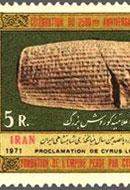 Cyrus, Ahmadinejad, and the Politics of Purim
Cyrus, Ahmadinejad, and the Politics of PurimWednesday, March 7, 2012 by Alex Joffe | Jewish Ideas Daily » Daily Features
At this week's pre-Purim meeting in Washington between President Obama and Prime Minister Netanyahu to discuss Iran's nuclear threat to Israel, Netanyahu gave Obama a present: the book (or m'gilah, scroll) of Esther, which tells how the Jewish heroine foiled Haman's plot to kill the Jews of ancient Persia.
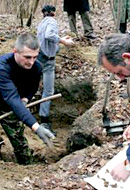 Toward an Archeology of Hell
Toward an Archeology of HellTuesday, February 7, 2012 by Alex Joffe | Jewish Ideas Daily » Daily Features
Remembrance is a contradictory imperative. Respectful preservation of the past, especially the remains of those who have gone before us, stands at odds with the need to understand the same past, especially through means like archeology.
 Highlights of 2011:
Highlights of 2011:Part II
Friday, December 30, 2011 | Jewish Ideas Daily » Daily Features
Part II of our round-up of the past year's most popular features on Jewish Ideas Daily. (Part I is here.)
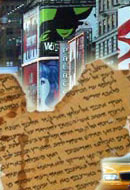 The Dead Sea Scrolls, Alive in Times Square
The Dead Sea Scrolls, Alive in Times SquareTuesday, November 8, 2011 by Alex Joffe | Jewish Ideas Daily » Daily Features
In the basement of a converted theater on West 44th Street, tucked between the legendary Sardi's restaurant and a bowling alley, a block from Times Square and across the street from the musical Memphis, is Discovery Times Square.
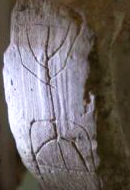 Mysteries of the Menorah
Mysteries of the MenorahThursday, September 8, 2011 by Meir Soloveichik | Jewish Ideas Daily » Daily Features
On the eve of Tisha b'Av, 2011, archeologists revealed artifacts newly unearthed from the great Jewish revolt against Rome (67–70 C.E.), including coins minted by the rebels and a stone incised with a sketch of the Temple menorah. But what is the menorah, and what does it symbolize?
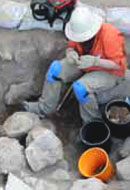 The New Biblical Archeology
The New Biblical ArcheologyMonday, July 25, 2011 by Alex Joffe | Jewish Ideas Daily » Daily Features
Every summer, the Israel Antiquities Authority holds a reception for foreign archeological teams excavating in Israel. This year's reception was attended by over 200 archeologists, who are investigating sites ranging in age from the Paleolithic through Islamic periods.
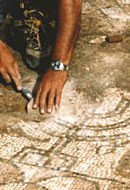 The Tourist’s Dilemma
The Tourist’s DilemmaMonday, June 20, 2011 by Alex Joffe | Jewish Ideas Daily » Daily Features
On the southwest coast of Albania on the Ionian Sea, opposite the Greek island of Corfu, beneath the modern town of Saranda, lies the ancient city of Onchesmos. That ancient city had a synagogue.
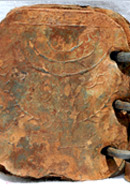 On Faith and Forgeries
On Faith and ForgeriesWednesday, May 4, 2011 by Alex Joffe | Jewish Ideas Daily » Daily Features
Remnants of the biblical world continue to surface like uncharted reefs along the shore, looming up and weirdly fascinating our nominally secular minds. One such set of objects, recently emerged, is a series of lead plates that appear to be embossed with writings and images and bound into books or "codices." What are they, how have they been received, and what does their reception tell us about our willingness to believe?
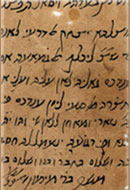 Sifting the Cairo Genizah
Sifting the Cairo GenizahFriday, April 1, 2011 by Lawrence Grossman | Jewish Ideas Daily » Daily Features
Everyone knows about the Dead Sea Scrolls, discovered over 60 years ago, and about the new light they shed on the sectarian Judaism of late antiquity, the beginnings of rabbinic Judaism, and possibly the prehistory of Christianity. Fifty years before that, the Cairo Genizah similarly revolutionized the picture of the Jewish Middle Ages.
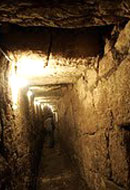 The Archeology War
The Archeology WarThursday, March 31, 2011 by Alex Joffe | Jewish Ideas Daily » Daily Features
The Islamic Educational, Scientific, and Cultural Organization (ISESCO) was founded in 1979 by the Organization of the Islamic Conference (OIC). It has three basic goals. The first is to spread a Saudi version of Koranic education throughout the Islamic world. The second is to publicize Islam to the non-Islamic world. The third goal is to oppose the "Judaization of Al-Quds"—i.e., Jerusalem.
Editors' Picks
The Birth of Monarchy Bible History Daily. New research on the Qeiyafa Ostracon, the inscription found in Khirbet Qeiyafa in 2008, suggests that it is the first archeological evidence of the coronation of King Saul.
What Have the Romans Ever Done for Us? AlphaGalileo Foundation. The discovery of a Hebrew inscription from the fourth century in Portugal is not only the earliest evidence of Jews in Iberia, but also testifies to a close relationship between Jews and Romans.
Witnesses to the Bible? Matti Friedman, Times of Israel. Two rare 3,000-year-old models of ancient shrines are among the artifacts claimed by an Israeli archeologist as evidence for the historical veracity of the Bible.
Caves of Refuge Eli Ashkenazi, Haaretz. A fifth mikveh has been found in the caves on the Galilee's Cliffs of Arbel, indicating that the people who lived there under Roman rule were most likely kohanim, Jews of the priestly class.
The Afghani Genizah Shai Secunda, Talmud Blog. We are starting to hear about the Jewish manuscripts recently discovered in an Afghani cave. But before we learn more, someone has to buy them.
Altarcation Dror Eydar, Israel Hayom. Adam Zertal's sensational discovery of "Joshua's altar" should have created a paradigm shift in archeology—that is, if anyone had believed him.
Found in Israel Avigayil Kadesh, Israel Ministry of Foreign Affairs. Every day, the Israel Antiquities Authority has 30 active archeological digs. Here, a list of the past 25 years' most notable. (With a glaring omission.)
Losing the Temple Mount Amir Shoan, Ynet. The Muslim waqf which oversees the Temple Mount is allowing archeological sites to be bulldozed, in contravention of the law. But instead of intervening, the Israeli government is covering it up.
Digging Tiberias Matti Friedman, Times of Israel. Long beloved of archeologists but overshadowed by more famous sites, the ancient metropolis of Tiberias is finally emerging from underneath soil, rubble, and the remnants of an old garbage dump.
Disjecta Membra Benjamin Balint, Los Angeles Review of Books. Not for nothing was the Cairo Genizah called "the Living Sea Scrolls": its discoverers revolutionized the study of Mediterranean Jewish life at the very moment that it was drawing to a close.

